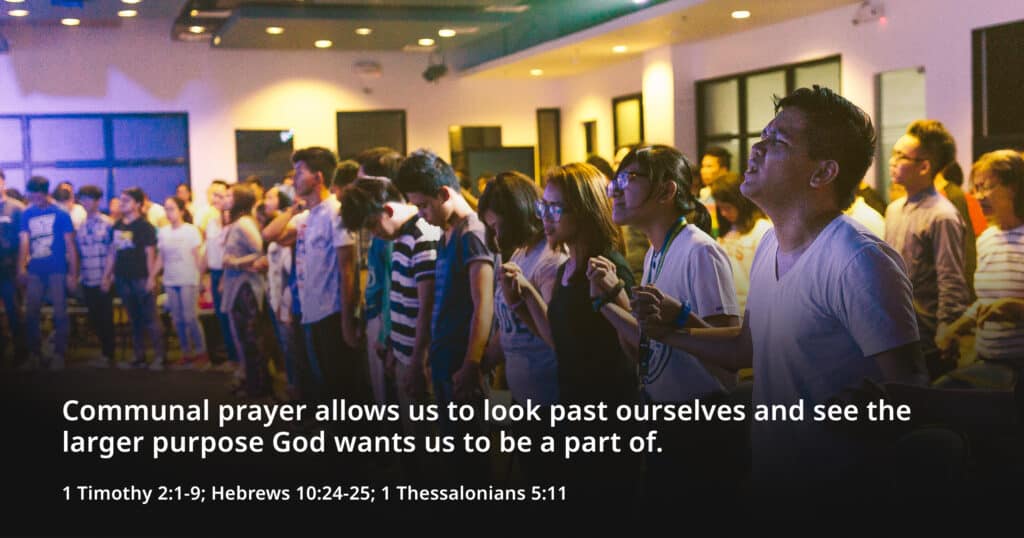God hears any sincere prayer to Him, no matter when it is prayed (1 Peter 3:12; 1 John 5:14, 15).

1 Thessalonians 5:17 even encourages us to “pray without ceasing” (ESV), going about our days in constant communion with God.
Sounds like there’s never a wrong time to pray! We can always stay in touch with God, seek His counsel, and find refuge in His presence—no matter the situation we find ourselves in.
But can the intentional timing of our prayers make a difference for us?
What does it really mean to pray without ceasing? And is there any benefit to scheduling our prayer time?
Let’s look at what the Bible says, and consider how we can apply what we find to our everyday lives. We’ll go over:
- Specific times that are good prayer
- Situations that often call for prayer
- Making prayer a treasured routine
- How we’re supposed to “pray without ceasing”
Specific times that are good for prayer
Looking through Scripture, there are particular times during the day when prayer is encouraged. One of the most well-known passages is found in Deuteronomy 6, where Moses delivers God’s instructions to the children of Israel.
And these words that I command you today shall be on your heart. You shall teach them diligently to your children, and shall talk of them when you sit in your house, and when you walk by the way, and when you lie down, and when you rise.
Deuteronomy 6:6-7 (NKJV)
This passage points out the importance of a daily connection with God, of thinking on His word every day, when we lie down and when we rise. This applies just as much to prayer as it does to other forms of devotion. We are to get in touch with God every day in order to strengthen our relationship with Him.
Praying in the morning
As mentioned in the above verse in Deuteronomy, there is benefit to praying “when you rise.” Other passages also encourage us to seek out God first thing in the morning.
O Lord, in the morning you hear my voice; in the morning I prepare a sacrifice for you and watch.
Psalm 5:3 (ESV)
Jesus Himself even made time for this kind of early-morning connection with God while He was on earth.
And rising very early in the morning, while it was still dark, He departed and went out to a desolate place, and there He prayed.
Mark 1:35 (ESV)
It makes sense, doesn’t it? Right after we wake up, before we’re bombarded by all the burdens, obligations, and distractions of the day, we can have a clear mind to connect with God.
Some people who have a long commute to work even have dedicated prayer time in the car, spending time with God before they arrive at the office.
Taking this opportunity for morning prayer can help us start the day with organized thoughts, along with renewed faith that God will be walking with us throughout the day. It’s a way to be intentional about including God in the day’s plans.
So we can see some good reasons for seeking God first, before we begin our day and the business of life gets us distracted. These passages of Scripture urge us to take advantage of opportunities to get in touch with God, and to seek His aid and guidance.
Mid-day prayers
Also included in Deuteronomy 6:6-7 is praying when we “sit in the house,” and other phrases that suggest making time to pray part-way through the day.
Often in the middle of the day, we’re ready for a break. This could be a lunch break, or it could be any downtime that doesn’t correspond with a meal. But either way, it’s a great time to pray.
Daniel, for example, prayed three times every day (Daniel 6:10). Psalm 55 suggests this as well, keeping our connection with God strong by coming to Him morning, noon, and night, “when you lie down, and when you rise”.
The principle here is to take a break to refocus on God. We dedicated the day to Him in the morning, but sometimes the rush of the day can tempt us back into stress mode. But He’s still there, walking with us throughout the day. And it can do us good to remind ourselves of that before we conquer the second half of the day.
And if we do stop for lunch, it’s always appropriate to thank Him for the time to pause, and thank Him that we have food to eat. It helps us continue the day with an attitude of gratitude.
Bedtime prayers
You may have noticed that the verses quoted from Daniel and from Deuteronomy also included references to the end of the day, when we “lie down.”
Here’s the perfect opportunity to discover the blessings you’ve received throughout the day. Knowing that you committed your day to God, even if it was a difficult day, can bring you peace. Because in this time of reflection in prayer, you might be made aware of little things here and there that helped you get through even the toughest parts of the day.
When I remember you on my bed, I meditate on You in the night watches.
Psalm 63:6 (NKJV)

And after a tiring day, it’s also a great time to claim some of God’s promises in prayer, such as:
Come to me, all who labor and are heavy laden, and I will give you rest. Take my yoke upon you, and learn from me, for I am gentle and lowly in heart, and you will find rest for your souls.
Matthew 11:28, 29 (ESV)
I lie down and sleep; I wake again because the Lord sustains me.
Psalm 3:5 (CSB)
In peace I will both lie down and sleep; for you alone, O Lord, make me dwell in safety.
Psalm 4:8 (ESV)
Maintain sound wisdom and discretion … then you will go safely on your way; your foot will not stumble. When you lie down, you will not be afraid; you will lie down, and your sleep will be pleasant.
Proverbs 3:21, 23, 24 (CSB)
And if you find yourself awake at night, think of it as yet another opportunity to pray. What better way to encourage sleep than talking to our Creator and Protector?
Want to learn more about enriching your prayer life? Scripture can show you how.
Are there any wrong times to pray?
We’ve seen how God is willing to listen to our prayers, day or night, and that the Bible urges us to keep our relationship with God strong by including Him in every part of our day.
This illustrates that there are no wrong times to pray. There are absolutely no situations where it is inappropriate to talk to God.
He is always listening. He is right beside you, no matter where you are. There is no time when our prayers might interrupt or distract Him.
What’s more, God certainly doesn’t want prayer to feel obligatory or ritualistic. Sincerity is what matters. Even if your hands aren’t folded and your head isn’t bowed, He hears you and knows your heart.
For example, if you’re driving your car while you pray, you’re not going to close your eyes. And God still hears you.
If you’re praying for guidance while in the middle of a tense conversation with a family member or co-worker, God hears you even if you’re fitting in this prayer between thoughts and responses.
God isn’t like some genie in a bottle where the prayer will only work if you say certain words or assume a specific posture. Prayer is active communication. It’s communion. And it’s building a relationship. There’s no template or formula that makes it work—just an open heart.
Are routine prayers important?
We’ve seen how God is always willing to listen to us when we pray and how there is never a wrong time to pray. But what about the prayers we pray as part of a congregation, or as part of a personal routine?
Why are those prayers important? Are they really as valuable to God as the personal ones we offer to Him when we pray on our own whims?
And how can we keep routine prayers from getting repetitive and boring? After all, we don’t want to feel like we’re just going through the motions of a habit.
There’s a well-known quote with several versions, but the gist of it is: “half the battle is just showing up.” Well, that’s what we’re doing for God, even in prayers that happen in groups, planned events, or routines we’ve set up ourselves. Just because it’s not impromptu doesn’t mean it isn’t, or can’t be, sincere. We’ve made the effort to “show up” in His presence, open to commune with Him.
Prayers before meals
Let’s start with a custom some of us might remember from childhood—praying before a meal. This small bit of thanks might not seem that important, but there’s plenty of value to be found in it. Pastor James Black, Director of Prayer Ministries for the North American Division of the Seventh-day Adventist Church, explains the importance of the routine before-meal prayer:
It is the perfect opportunity to express to God how grateful we are for every meal. It is also an opportunity to pray for those who are impoverished. The value of mealtime prayers is that they are simplest when teaching children to pray. During these formidable years, children catch a glimpse of God our provider.
When we’re young, routines and traditions have a strong impact on us, and as we grow older, that impact remains. We begin to see God as a loving provider, the one responsible for all the good things we have, and before-meal prayers become a reminder of that love.
In a day full of problems and distractions, it gives us an opportunity to stop and be grateful for what He’s given us. It also allows families and groups of people to acknowledge their relationship to God and to each other.
Corporate prayers
Another form of routine prayer is congregational prayer at church. Such prayers might not seem as meaningful or personal as the ones we have during our own devotions, since they’re given by someone up at the pulpit and not by us. But these prayers have their place in the Christian life as well. They remind us we are part of the body of Christ. We are not alone—we have an entire church family to care about, pray for, and pray with.
Also, just because we aren’t the one offering the prayer we’re not still in communion with God. If we have a prayerful spirit and a genuine desire to connect with Him, God connects with us through a prayer at church just as easily as if we were alone in our rooms. Pastor Black explains it this way:
Prayers prayed during church are very meaningful to a believer. Prayer should be the center of what takes place between God and you during this time. Whether sitting the pew or kneeling at the altar, the closeness one encounters with God in the sanctuary is inspiring. We can ‘leave it all at the altar,’ as it were. We empty ourselves before God and receive His forgiveness and cleansing.
Whether it’s a prayer given by a pastor up front or our own personal praises and desires, God is always nearby, ready to listen.
The ones we pray as part of a routine or among a group of people are no less meaningful than our own personal devotions. Sometimes they might even have an impact that adds onto what we experience in our personal prayers to God.
We see that the early church understood the importance of praying as a group, of uniting together to thank God for His blessings and lay their worries and troubles before Him, knowing He would care for them (1 Timothy 2:1-9; Hebrews 10:24-25; 1 Thessalonians 5:11). They understood this sort of fellowship would bring them closer together, strengthening their commitment to God and to each other.

When we pray as part of a church, a family, or a community, it allows us to see past our own personal struggles and gain a wider perspective. We see ourselves as a part of the Body of Christ, here to help and encourage others.
We don’t always get that in our personal devotions, when we’re so focused on our own lives and obligations. Communal prayer allows us to look past ourselves and see the larger purpose God wants us to be a part of.
Prayer is how we connect with God. So any time at all that we open our minds to connect with Him, we are praying. While some times of day might be easier for us to focus, or easier for us to call to mind everything we want to share with God, there’s never a time when it isn’t beneficial to pray.
Think of it like a relationship with any friend. If you both want to see each other, is there ever a bad time? Sure, there might be more convenient times…or times that allow for more dedicated communication. But you’d never pass up an opportunity to see someone you care about. We don’t only see people we want to see what it’s the best possible time. We talk to them whenever we can!
It’s the same with prayer. There’s no wrong time to pray. That’s part of how we “pray without ceasing” (1 Thessalonians 5:17).
But we can also remember what we’ve learned about the benefits of designating certain times for prayer, which can deepen our experience.
Ready to learn more about prayer and the God we pray to?